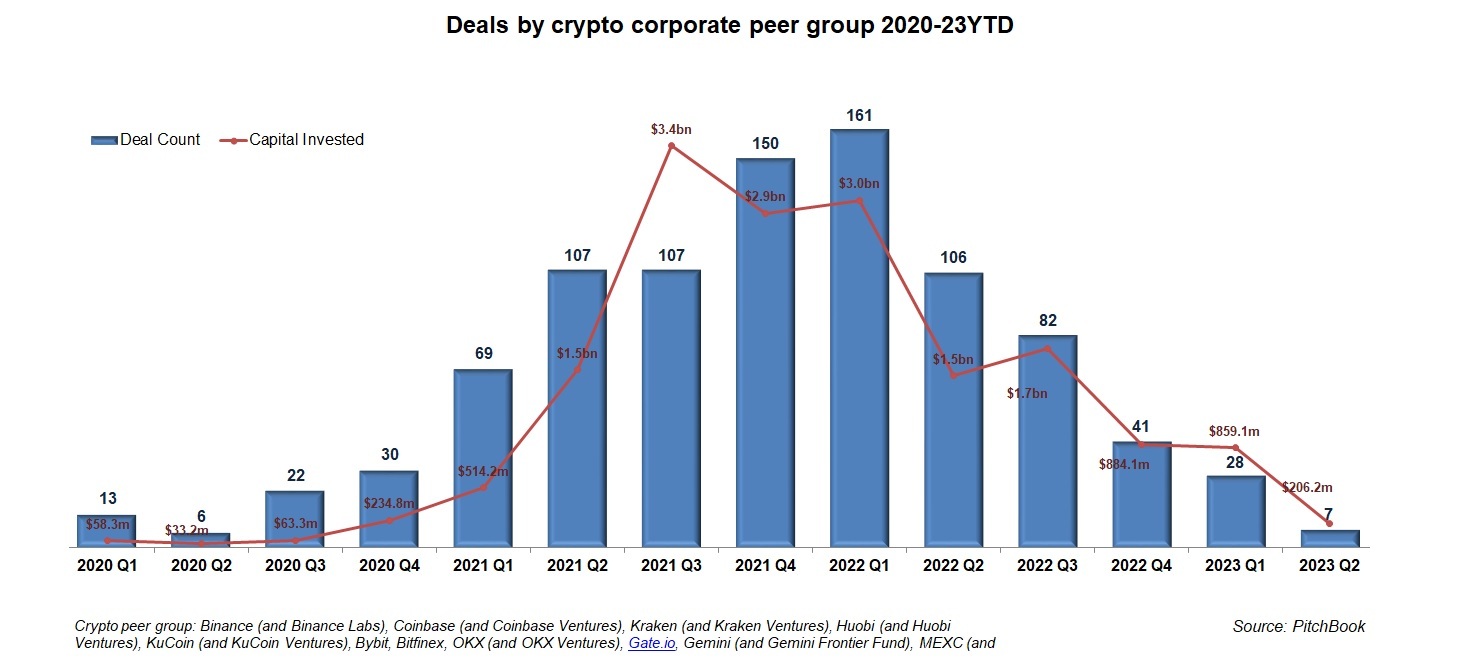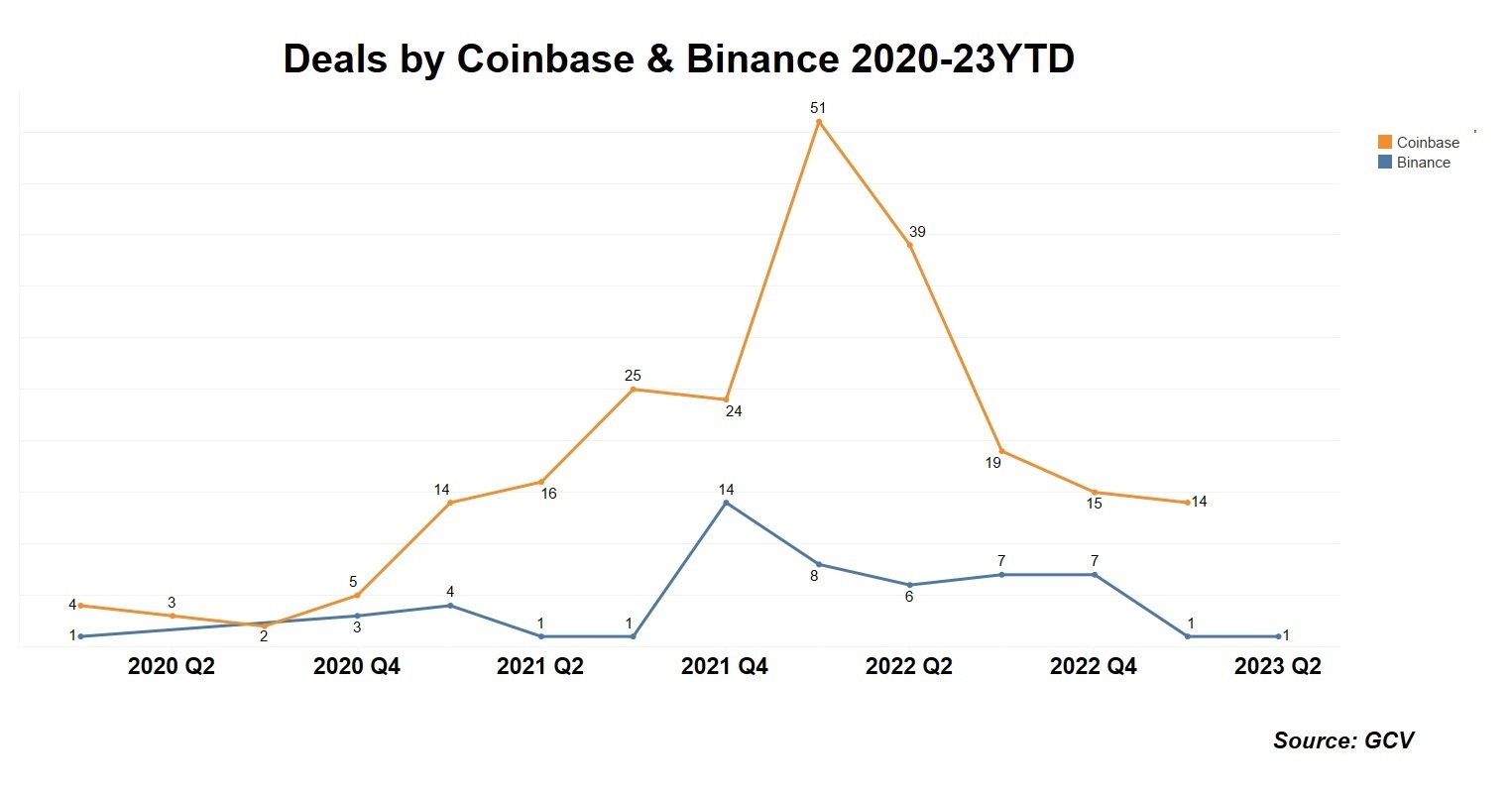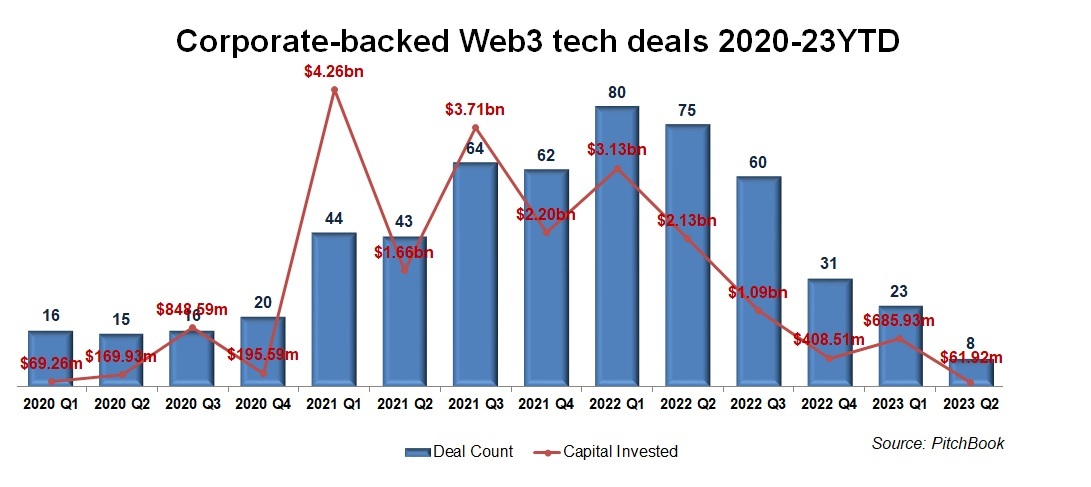
Cryptocurrency exchanges emerged as some of the most active corporate venture investors in 2020 and dealmaking soared in 2021, only to come back down to earth in the past six months amidst a series of events highlighted by the failure of one of the biggest exchanges, FTX.
The 12 most active exchanges were Binance, Coinbase, Kraken, Huobi, KuCoin, Bybit, Bitfinex, OKX, Gate.io, Gemini, MEXC and Crypto.com. Investments by this group numbered more than 100 per quarter from April 2021 through the first half of 2022 (though several represent multiple investments by different exchanges in the same round) but dipped below 30 in the first quarter of this year (see below).

Confidence in the crypto sector has declined since the collapse of FTX, which had raised $2bn in VC funding and was valued at $32bn, in November 2022 along with affiliate hedge fund Alameda Research.
FTX was not the only highly public failure in the cryptocurrency sector, though. Stablecoin developer Terra went bankrupt almost overnight last May after losing its peg to the US dollar. Two months later, cryptocurrency hedge fund Three Arrows Capital filed for bankruptcy, dragging down some of its main lenders, Voyager Digital, Genesis Global Trading and Celsius Network, in its wake.

Cryptocurrency startups are also moving on to raising later-stage rounds now, which is slowing down the rate of deals.
It’s one thing to invest at seed stage when a startup has a low valuation and your exposure is low, but committing capital later on represents a far bigger risk. Many early-stage companies in the sector profited during the boom period but it becomes trickier to raise your next round if it means convincing your existing backers (many of whom are not crypto corporates) to accept a big cut in valuation.
Another problem is the heightened regulatory oversight. Binance and Coinbase, two of the largest crypto exchanges as well as two of the biggest corporate VC investors over the past two years, were charged with legal violations by separate US regulators last month.
The status of each case is currently unclear – one covers digital assets as commodities and the other as securities, and Coinbase is in the process of countersuing – but Gemini had already been charged by the US Securities and Exchange Commission in January and Kraken settled a similar case weeks later.
The exchanges say the investigations are having no effect on their everyday activities, but blockchain startups may be reluctant to bring companies that are under legal investigation into their investor consortia.

A further issue is that there is simply less cash on hand for the exchanges. Many hold their assets in crypto tokens and although several of the larger currencies are trading marginally up this year, all of them remain far below their late 2021 peak. Although several crypto companies have sizeable portfolios of startups, there have been few exits and so recycling returns is not an option.
The decline in deal numbers is reflected in the overall funding numbers for startups in the Web3 sector – cryptocurrency technology as well as NFTs, decentralised finance and blockchain technology.

Blockchain technology is still struggling to find obvious commercial uses. Play-to-earn gaming is yet to take off outside of a small, dedicated user base. NFT trading numbers are still significantly down from a year ago and remain heavily reliant on one or two platforms – one of which, Blur, is offering rewards for traders, leading to questions over how much of its trade traffic is actually organic.
So, what are the prospects going forward? The collapse last month of Silvergate Bank, which allowed crypto companies to exchange fiat currency around the clock and which counted Coinbase, Kraken, Crypto.com and Gemini as customers, is the latest blow to the beleaguered sector. The failure did not hit as hard as the collapse of Silicon Valley Bank did for its startup customers, but it represents another complication for investors that deal heavily in tokens.
Nevertheless, there are still deals occurring. Coinbase Ventures backed 14 startups in the first quarter of this year, while Binance Labs has contributed to three deals this month after a quiet Q1. There are adjacent investors too. Moonpay is a crypto infrastructure company rather than an exchange but has become increasingly active in CVC this year.
Activity may well depend on whether the relative – and we do mean relative – stability of the last two or three months in the crypto markets can last for an extended length of time.
Web3 is not a portion of the market known for conservatism, and many of the main exchanges retain VC units even if they are less active than before. But given an apparent gap in late-stage deals and no major exits to speak of, the pace of early-stage investment seen in the last two years will be hard to match.
